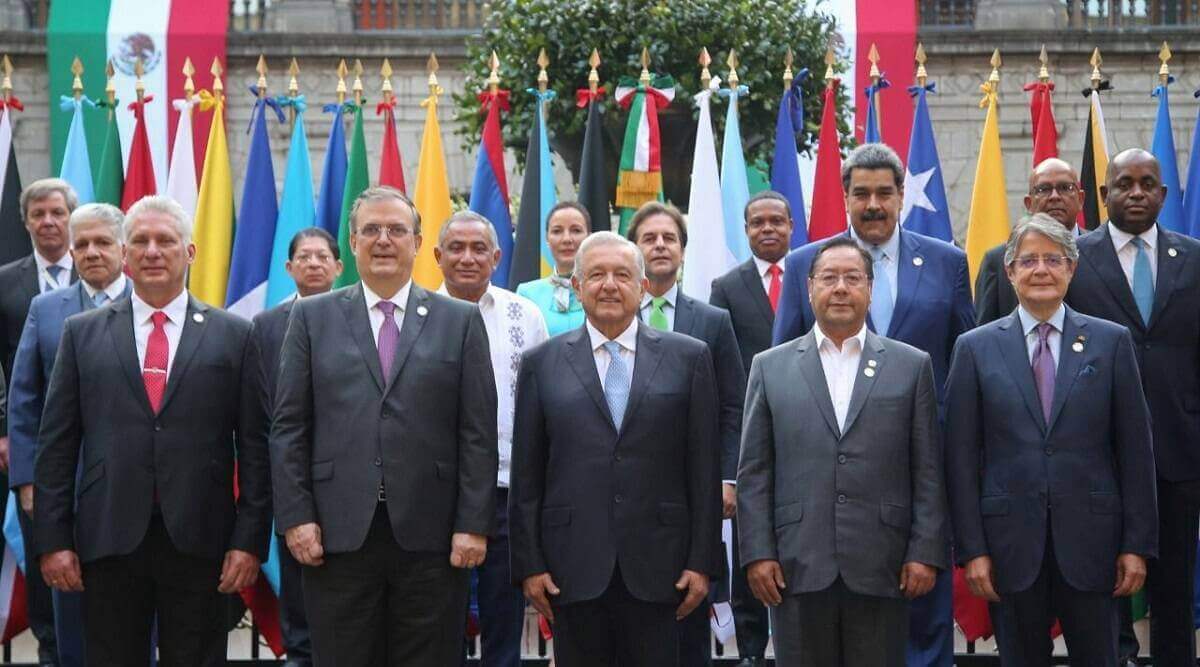On Saturday, the 31 members of the Community of Latin American and Caribbean States (CELAC) met for a summit between a number of high-ranking officials across the region. The summit was attended by a number of heads of state, including: Uruguayan President Luis Lacalle Pou, Argentine President Alberto Fernández, Cuban President Miguel Díaz-Canel, Costa Rican President Carlos Alvarado Quesada, Ecuadorian President Guillermo Lasso, and Mexican President Andrés Manuel López Obrador. The conference, hosted by Mexico, was also attended by two vice-presidents, and nine foreign ministers, and a number of other high-level representatives.
Following the summit, members released a joint statement affirming their support for Argentina’s sovereignty over the Malvinas Islands, which the United Kingdom claims as its own and calls the Falkland Islands, and called for an end to the United States’ (US) blockade against Cuba.
However, this point also stirred controversy, as a number of countries rejected Uruguay divergent stance on the matter. Uruguayan President Lacalle Pou said that his attendance at the summit was in no way indicative of his acceptance of countries where “there is no full democracy” and where opposition is silenced and human rights are ignored, pointing to Cuba, Nicaragua and Venezuela.
Following this, Cuban President Díaz-Canel criticised Lacalle Pou for “changing the conditions to adjust fuel prices” despite huge domestic opposition. In response, however, the Uruguayan leader said that “luckily the [Uruguayan] opposition can gather signatures” and “has democratic means to complain,” unlike in Cuba.
Cuba, meanwhile, used the summit to offer its COVID-19 vaccines to its regional partners, given that it has produced three vaccines and has two further candidates. Díaz-Canel highlighted this as an example of Cuba’s scientific and technological skills, which he asserted could be further harnessed if the US were to put an end to its blockade against the Caribbean island nation.
Likewise, Paraguay invited anger from Venezuela when President Abdo Benítez said that he would not recognise the Maduro government, declaring: “My presence at this summit, in no sense or circumstance, represents recognition of the government of Mr. Nicolás Maduro. There is no change in the position of my government and I think it is chivalrous to say it up front.” This drew a swift response from the Venezuelan leader, who rejected Uruguay and Paraguay’s “sheer provocation and aggression.”
Maduro also called for the resumption of ministerial councils on economic, social, and political issues to advance trade integration and economic development. López Obrador echoed these sentiments, but said that regional integration could only be achieved if members agreed on “three basic issues: non-intervention and self-determination, cooperation for development, and mutual aid to combat inequality and discrimination.” He thus rejected the use of sanctions, force, and the media to interfere in the internal affairs of other countries.
The Mexican leader said that overcoming these obstacles could empower CELAC to “become the principal instrument to consolidate relations between our Latin American and Caribbean nations” and allow for them to build an economic community similar to the European Union.
Paraguay and Uruguay also drew flak for expressing their support for the Organization of American States (OAS), which several other countries have denounced as a tool of the US government.
Mexican President López Obrador, for instance, said, “Controversies over democracy and human rights should be worked out in truly neutral forums created by the countries of the Americas, and the last word should be left to the specialized agencies of United Nations.”
In fact, in the recent past, López Obrador has on various instances called for the OAS to either be reformed or replaced, saying it is not an autonomous organisation. He has received support from various leftist leaders across the region, including from Peru, Bolivia, Cuba, Argentina, and Venezuela.
In other developments, Bolivian President Luis Arce called for a moratorium or waiver of debt owed by poor countries, while Honduran President Juan Orlando Hernández pled for a regional body to combat the effects of climate change.
Furthermore, the joint declaration issued following the summit approved a collective fund to deal with natural disasters. Furthermore, the officials agreed to allocate $15 million towards pandemic measures and establish a regional health body. Mexican Foreign Minister Marcelo Ebrard also celebrated the creation of the Latin American and Caribbean Space Agency
The summit was also attended by European Council President Charles Michel, who said that the two blocs must increase cooperation in the fields of vaccines, medicines, climate change, and the ‘digital revolution’. He also urged members to uphold the following: “the rule of law, human rights, protection of the rights of women and girls, protection of the rights of minorities, freedom of expression, press freedom, democratic institutions, electoral legitimacy, representative elections, [and] free and fair elections.”
In addition, Chinese President Xi Jinping delivered a video address in which he said that CELAC has provided an avenue to expand China’s relations with Latin America.
The members of CELAC, which was established in 2011, are: Antigua and Barbuda, Argentina, Bahamas, Barbados, Belize, Bolivia, Chile, Colombia, Costa Rica, Cuba, Dominica, Ecuador, El Salvador, Granada, Guatemala, Guyana, Honduras, Jamaica, Mexico, Nicaragua, Panama, Paraguay, Peru, Dominican Republic, St. Lucia, St. Kitts and Nevis, St. Vincent and Grenadines, Trinidad and Tobago. Uruguay, and Venezuela.
Brazil withdrew from the Community in January 2020 because “CELAC had not been generating results in defense of democracy or in any area,” arguing that it was now being used as a “stage” for authoritarian states like Venezuela, Cuba, and Nicaragua. Given the pushback Paraguay and Uruguay received at this most recent summit, it is evident that Brazil’s criticisms aren’t without merit.
Leftist Nations Take Aim At Paraguay and Uruguay in CELAC Summit
Members released a joint statement affirming their support for Argentina’s sovereignty over the Malvinas Islands and called for an end to the United States’ (US) blockade against Cuba.
September 21, 2021

IMAGE SOURCE: REUTERSMember states approved a collective fund to deal with natural disasters and $15 million towards pandemic measures and establishing a regional health body.
